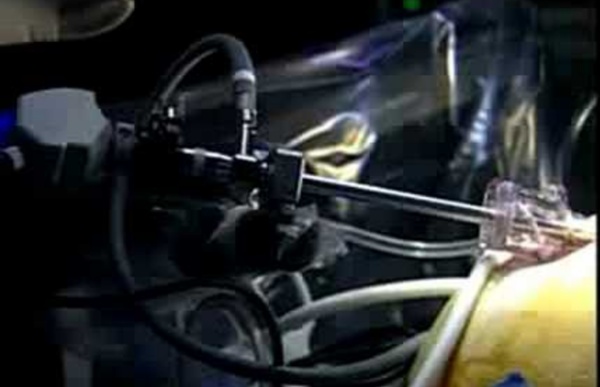



http://www.youtube.com/watch?v=jbfW_DjktK4
Germ-zapping robot could support war against Ebola (w/ Video) Some years ago, when Ebola was not in any global news headlines, researchers presented their paper, "Use of Medical Robotics in Biothreat Situations" to an American Medical Informatics Association symposium where they said that "In biothreat situations, mobile robots have several advantages over humans including: imperviousness to infection; ability to be coated in self-decontaminating surfaces; 24-hour availability; and the ability to serve as a virtual telepresence and communication conduit for one or more participants. In the case of new biothreats, mobile robots could carry some of the burden that falls upon clinicians including: collecting lab specimens, delivering medications and meals, transporting bio-hazardous materials and biological waste." Healthcare associated infections (HAIs) are a burden for patients and doctors who must invest time and money in additional treatment for these illnesses. Error loading skin: Error loading file
Scientists Consider Repurposing Robots for Ebola - NYTimes.com Photo Robotics scientists nationwide are pondering an intriguing possibility: Might robotic technologies deployed in rescue and disaster situations be quickly repurposed to help contain the Ebola epidemic? A robot that could perform even some of the tasks of a human, such as waste removal or the burial of bodies, would have significant lifesaving potential.
10 Medical Robots That Could Change Healthcare From microbots that scrape plaque from arteries to personal assistant robots that help care for patients, medical robots are transforming the face of healthcare. 1 of 11 Robots aren't new to healthcare. Remember the da Vinci Surgical System, the surgical assistant the FDA approved back in 2000? Robots taking over to help medical research It has been a long and stealthy takeover, but robots now dominate many leading bioscience laboratories, doing in just hours what once took days or weeks. Now the convergence of automation with nanotechnologies, biomedics and advanced algorithms promises to take robotization of medical research much further. In May of this year, Ross King, professor of machine intelligence at the UK's University of Manchester, traveled east to talk to students at the University of Nottingham campus in Ningbo, China.
Medical Robotics and Computer-Assisted Surgery: The Global Market 2014 LONDON, Oct. 14, 2014 /PRNewswire/ -- This report identifies and segments the main types of medical robotics and computer-assisted surgery (MRCAS) devices that have been commercialized to date. It analyzes the historical and current volume and value of shipments of each of these product segments in specified applications and geographical markets. It also evaluates the impact of demographic, economic and other factors that will drive future demand for MRCAS devices and includes forecasts through 2019.
Medical robotics: Would you trust a robot with a scalpel? Driverless cars? Google has already wheeled one out. Robo-cops? Prototypes are on the scene. Medical robots Medical robots are robots that allow surgeons greater access to areas under operation using more precise and less invasive methods. They are in most telemanipulators, which use the surgeon's actions on one side to control the "effector" on the other side. Types of medical robots[edit]
Medical Robotics - Assistive robots Today, robots are already assisting humans in making diagnoses, and planning and administering medical treatment. In the future, mechatronic assistants will also help to improve the autonomy and quality of life of patients and other people in need. In the area of Medical Robotics, KUKA Laboratories offers kinematic systems and technologies at the highest level of technical expertise.